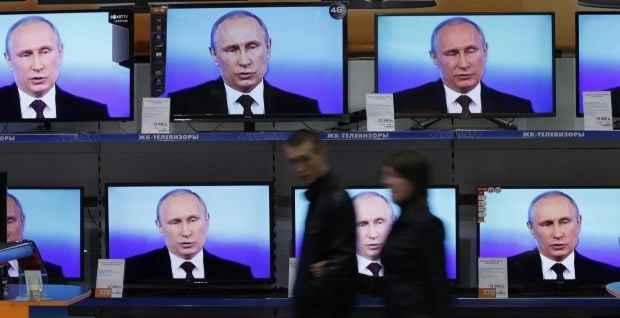
Euronazis: Who Supports Putin in the West?
Full list of foreign observers to a Crimean pseudo-referendum has become public. Names of “friends of Putin” (who doesn’t stop claiming that there has been a “fascist coup” in Ukraine) will make you consider very carefully, who should be called a fascist.
Back in early March of 2014, two weeks ahead of the pseudo-referendum and annexation of Ukrainian Crimea, in one of the Russian newspapers, a prominent historian and religious studies specialist Andrey Zubov published an article in which he criticized the policy of Kremlin towards Ukraine, comparing actions of Russian government to ones of the Nazi Germany. This, in fact, cost the professor his job at MGIMO (Moscow State Institute of Foreign Relations).
The US Senator Hillary Clinton drew an analogy between Putin and Hitler, “Now if this sounds familiar… All the Germans that were ... the ethnic Germans, the Germans by ancestry who were in places like Czechoslovakia and Romania and other places, Hitler kept saying they're not being treated right.” And the day before the Crimean pseudo-referendum, a Latvian MP Kārlis Seržants placed Putin on a par with such notorious dictators as Hitler and Mussolini.
Putin’s address to a State Duma on the annexation of Crimea has confirmed that such opinions are not at all unfounded. One could pretend that there were no standing ovations from MP’s who saluted the annexation of Crimea in unison. One could forget that just two weeks prior, Putin rejected a possibility of Crimea’s annexation to Russia. One could turn a blind eye to the fact how Putin described Ukraine’s new government – “anti-Semites”, “fascists”, “Russophobes” – allegedly exercising “terror, murders and pogroms” upon Russian-speaking Crimeans, considering that none of this had taken place.
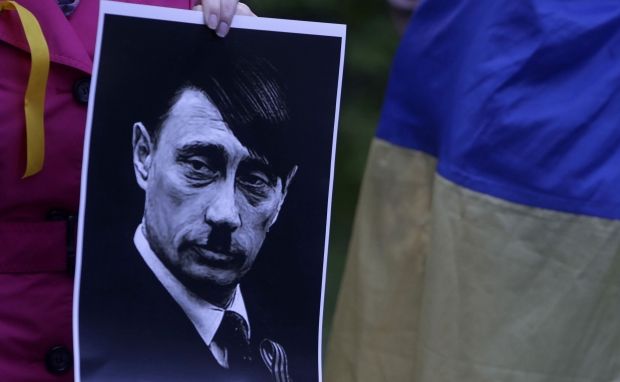
But the whole world has understood that Putin will not stop with just Crimea – just as Hitler with the Sudetenland (a German-populated region in Czech Republic; Hitler invaded Czechoslovakia using the guise of protecting the rights of the native Germans). In late March, “The Daily Mail” mentioned, Hitler also claimed that his ambitions don’t go further the Sudetenland: “I declare that the border between France and Germany is final. The West does not interest Germany”. Five months later he occupied the rest of Czechoslovakia. 14 months later he invaded France. And in early April, “green men”, whose presence in Crimea was denied by Putin until lately, were spotted in the Eastern Ukraine.
On April 17, by the way, the Russian “Führer” stated that a civil war is now breaking up in Ukraine, as armed fascists and Nazis from its western parts rampant in the country’s South-East. “Where nationalism blossoms and even neo-Nazism is being reborn – these are the western parts of Ukraine. Partly they used to be under Czechoslovakia, partly under Poland, Hungary. And nowhere were they full-fledged citizens of these countries… It is kind of forgotten that they were second-class citizens there. But it is buried somewhere deep inside, in historical memory. These are the origins of this nationalism,” said Russian President.
“To love one’s own country and to fight for it is not fascism and it is not neo-Nazism, as V. Putin claims. Fascism and neo-Nazism is the attempt to conquer, subjugate and humiliate another nation, another independent state. This is exactly what, with great treachery, Russia is doing in Ukraine today... Ukrainians have always supported and continue to support friendly and equal relations with the Russian people that are based on principles of mutual respect. However, it is this very “pseudo-brotherly” attitude on the part of the Russian powers throughout many centuries that have forced Ukrainians to fight for their rights, for their independence, for their national dignity,” Ukrainian Foreign Office retorted the statements of Russian President.
Who is Fascist to Whom?
Furthermore, Ukrainian diplomats have published information on European political forces, representatives of which back Russia’s aggressive stance toward Ukraine. The list of “foreign observers” at the “referendum” in Crimea is quite impressive, as there is a number of ultra-right and neo-nazi politicians among “Putin’s friends”. UNIAN has already partly covered the story on”achievements” of most of them in their home countries, disguised with the ideas of nationalism.
A more detailed document is available now. The main behavioral model of European ultra-right political forces is defending an indigenous nation and searching for enemies. Such enemies are often found assigned amongst migrants or national minorities. The party “Jobbik” - Kremlin’s satellite in Hungary – uses anti-immigrant, anti-Roma and anti-Semite rhetoric on regular basis. For instance, the party leader Gábor Vona calls for restricting birthrate for Gypsies, taking gypsy children away forcefully from their “lazy parents” and placing these children in social facilities.
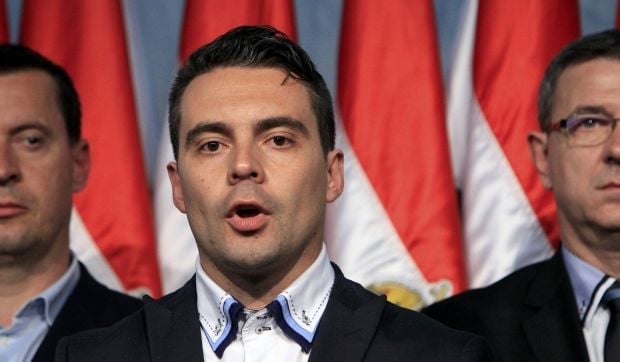
Among party supporters there are many young men, dressing up in pseudo-Nazi uniform, who are seriously concerned with the “Jewish colonization of Hungary”. Gábor Vona repudiated anti-Semitism and tried to prove that "Jobbik" has nothing to do with this idea. But in 2012, one of the members of the party called to make a list of Jews who pose a threat to the security of Hungary, thus provoking a huge scandal. As a result, at the European Jewish Congress "Jobbik" was referred to as the neo-Nazi party.
Actually, modern neo-Nazis in Hungary have claims to all the neighboring countries. In particular, they do not mind "chopping off" Transylvania from Romania and Transcarpathia from Ukraine. Naturally, using the guise of protecting ethnic Hungarians. Sounds familiar? World War II also began with the return of "ancestral lands" and, unfortunately, has not limited to the restoration of historical "justice". In this respect, it is not surprising that “Jobbik” backed Putin in his implementation of a plan of Crimea’s annexation. Even more, it is believed that Kremlin has been quite generous in financing its Hungarian “friends”.
Crimean Lessons for Spain and Belgium
Apparently, in anticipation of Russian support in their issue, representatives of Spanish right-wing parties “Catalan Platform” and “People's Party” have recognized a pseudo-referendum in Crimea. “Catalon Platform” in particular, speaks against “Muslim invaders” and seeks independence for Catalonia. In this regard, the example of the “referendum” in Crimea can be very useful for them. It is even more interesting for the People’s Party. While in opposition, it approved the actions of the Spanish government in its fight against terrorism, especially regarding suppressing the extremist ETA, which spoke for the independence of the Basque country. Now, while in power, the People's Party does not support the referendum in Catalonia. In this regard, it is surprising that its representatives believe Crimean referendum to be legitimate and justified. But they explain this illogical move quite simply. They say that Crimea has not voted for independence but for reunification with Russia (especially since half a century ago it used to be one country). While Catalonia wants to completely break away from Spain.
Members of the Belgian far-right-wing separatist party “Vlaams Belang”, represented in Crimea by three “observers”, also advocate the independence of Flanders from Belgium. This is political force was earlier noted for its xenophobia and discrimination of Belgians who, in its opinion, do not adhere to "traditional Flemish values". It even reached the point when the Belgian Court of Appeal condemned Vlaams Belang for discrimination against immigrants. In fact, after that, the party was even forced to review its political program.
Alone among other Putin’s Belgian satellites stands a founder and leader of the Universal National European Party Luc Michel, the follower of the prominent Belgian Nazi Jean-François Thiriart. Michel is known in Belgium and France as an ardent anti-Zionist and Holocaust denier. Earlier, this “activist” was a member of the Federation of National and European Action, which was disbanded by decision of the French government for justifying the actions of the Third Reich.
The party currently headed by Michel advocates the establishment of “a great European empire” with the participation of European and ... countries of former USSR. The participation of non-European countries in the empire is not excluded (probably because the European part of Russia, and, especially, the former Soviet Union, is not so vast).
Luc Michel’s National European Party regularly supports nationalist regimes – like ones of Milosevic in Yugoslavia and of Gaddafi in Libya.
Separatism and Double Standards
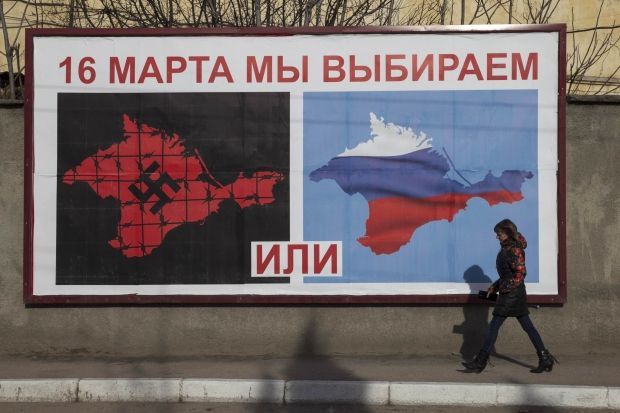
Actions of Putin in Crimea are also not condemned by prominent separatists in Italy, where, by the way, neo-fascism was born. In particular, we are talking about right-wing parties “Tricolor Flame "," Forza Italia" and "The Northern League" that provided their "observers" for a pseudo-referendum in Crimea. "Tricolor flame", does not hesitate to indicate neo-fascism as its official ideology and has become famous in Italy for its promise to pay monetary compensation to parents who would name their children in honor of the Italian dictator Benito Mussolini and his wife.
In its turn, the Northern League stands for independence of Northern Italy and the formation of an independent state Padania . In addition to extreme nationalism, there are some frank slips of racism in the ideology of the party. In particular, the League believes, there are drastic differences between "Northern Italians, adherents of Celtic- Germanic traditions”, and the “lazy Southern-Romans”. Ideas of separatism have been promoted by “The Northern League” since 1980. And in 1996, it even declared “independence of Padania”. However, Italy's authorities simply ignored this decision, and there were no supporters of the idea to defend the "independence" of the country’s North.
Later, having made their way to the government of Vladimir Putin's longtime friend Silvio Berlusconi (leader of Forza Italia), Northern League, straddled the idea “federalization”, to which it still adheres, instead of separatism.
French neo-Nazis from the party “National Front” are just as ardent supporters of Kremlin regarding the annexation of Ukrainian territory. Like the Hungarians, they have their “enemies” – Muslims. National Front and its leaders were several times in the center of scandals when they were accused of anti-Semitism and racism. For example, the National Front favors a ban for special menus at schools for Muslim students. They also compare Muslims who perform namaz on French streets with the German occupiers during the Second World War. By the way, the National Front candidate himself has called the victory of the party in the recent local elections in the Var department of the town Brignoles “the Nazi occupation”. After this, he was suspended from participation in municipal elections by his party.
However, it is not the first time that the National Front uses double standards in its policies. For instance, the party’s spokeswoman to the National Assembly of France Marion Maréchal-Le Pen, earlier criticized the supply of weapons to Syria, saying that the country should decide the fate of the Syrian people on its own. At the same time, she would not recognize that Assad, whose overthrow the Syrian people is trying to achieve, receives weapons from Iran and Russia.
But the main foreign policy objective of the National Front is the demise of the EU and NATO, as well as replacement of these entities with the “partnership of independent states”. However, the members of the National Front see such independence as a rather conventional one. For this partnership, in their opinion, should include Russia and be controlled by the Central Powers in Berlin, Paris and Moscow. Now wonder, the local media called the party's founder Jean-Marie Le Pen (now the party is run by his daughter party Marine Le Pen) a French fascist.
Serbian and Bulgarian nationalists, in their turn, are united with love for Russia and Putin by a combination of several common ideas, the main of which is religion. And the Bulgarian "Ataka" and Serbian "Dveri" are deeply religious, therefore the Orthodox faith is often more important for members of these parties than ethnic issues. Hence, there is an attraction to the Russian Orthodox Church and, as a consequence, to the Kremlin. In addition, they are united by two ideas: anti-immigration policy and the opposition to the issue of European integration.
Both ideas, in fact, are inherent to Putin’s Austrian allies, representing right-wing alliance “For the Future of Austria” and the ultra-right “Freedom Party”. Both political forces favor tighter control on the issues of immigration and family support. It is noteworthy that a Freedom Party was originally founded by retired officers of the Wehrmacht and Waffen-SS.
In general, the ultra-right ideology always includes authoritarianism and one of the forms of xenophobia - hatred toward anything foreign, in addition to nationalism. That is why one can often hear such mottos as “France for the French” or “Hungary for the Hungarians” in the rhetoric of “Putin’s friends” And it is surprisingly echoes traditional motto of “Russian marches” – “Russia for Russians”.
Fascism in the Guise of Communism
Not only the right-wing but also the left-wing political forces in Europe show tangible support for Putin in Europe have not only the right but also the left-wing political movements. Such include members of the Communist Party of Greece or a pro-Russian party “For Human Rights in United Latvia”. Russian movement in Latvia, in particular, is an advocate for the rights of national minorities. So, basically, it calls for recognition of Russian language in Latvia as a second state language, as well as for a free choice of language in public schools. Besides, the movement wants the Orthodox religious holidays to be recognized by the state, just as the Catholic holidays.
In Germany, Russia is actively supported only by the Left Party, full of contradictions. Despite the fact that the "left" welcome the European integration process, oppose militarism and call for strengthening the role of the UN in international politics, they see Communists as their political partner in Russia. At the same time, the most members of the Left Party are staunch anti-Stalinists and opponents of the “nationalist accents”. So, on the one hand, Germans are disgusted by Russian Imperial rhetoric and nostalgia for the Soviet era, on the other hand they support annexation of Ukrainian Crimea by Russia. They also call the EU sanctions imposed on Kremlin a policy of double standards and pandering to the radical politicians in Kiev.
One more political force, full of controversies, that backs Russia, is the Anti-Fascist Committee of Finland. In particular, its members deny the right of Estonia and Latvia to exist as sovereign states, they resent the fact that the authorities of the Baltic States equate Communism and Fascism, considering it a “Holocaust denial”, and they also strongly justify Stalinism. For example, they consider Soviet deportations in Estonia as "anti-fascist" as "beneficial".
Just Five Nationalists in Power
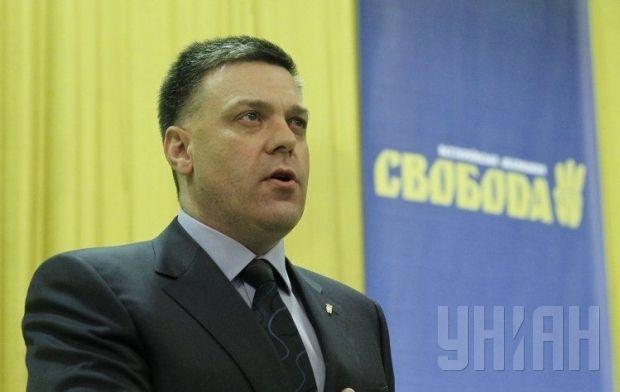
Considering the above-mentioned, it is amazing how Vladimir Putin, on the one hand, has been supporting representatives of the ultra-right European parties and drawing them on his side, and on the other hand encouraging for more than a month to clear the Ukrainian authorities from "fascists". But are there even any within current Ukrainian authorities or do they only exist in the imagination of the Kremlin’s chief?
Nationalist movements, organizations, political parties and individual activists were important "cogs in a wheel" in the process of obtaining Ukrainian independence in 2004, during the Orange Revolution, and from the beginning of Euro Maydan in November 2013. But Ukrainian nationalism is not a key factor in these processes, and the image of the "Bandera" nationalist with a bloody trident could only have been born in the mind of our “neighbors” deluded by propaganda-stained journalism (referred to as “kiselyovschina”).
This is evidenced by the fact that until today nationalists could not get the real political power, neither in 90s nor during the “rabid” nationalist Viktor Yushchenko, nor today. For example, the UNA-UNSO, leading nationalist force in the 90s, only managed then to obtain four seats in Parliament. In 2002, for the first time the leader of the radical nationalist party “Svoboda” Oleh Tyahnybok became an MP. In 2010, he was running for president, but he only took the 8th place with 1.43% of votes. By the way, the leader of the Right Sector Dmitro Yarosh may show just a bit better result at the current presidential elections (according to opinion polls - 1.6 %).
As for the party “Svoboda”, it only became an independent player in the parliament in 2012, getting just 37 seats out of 450. For the comparison, at that moment, a pro-president Party of Regions had 187 seats in Verkhovna Rada.
Even when new people came to power (after ex-president Viktor Yanukovich disgracefully fled the country), less than ten people, that more or less declare to have some connection to nationalist circles, have achieved top positions in new Ukrainian power. For example, one can name Andriy Parubiy, current head of National Security and Defense Council (SNBO). Back in the 90s he organized young nationalists. One can also name a member of “Svoboda” Oleg Makhnitskiy, once an MP and Parliamentary Commissioner for the Supervision of the Prosecutor’s Office, who now holds a position of the acting Prosecutor General of Ukraine.
In regard to the nationalists in Ukrainian Government, only three members of “Svoboda” represent this political force in the Cabinet of Ministers. Alexandr Sych is now a Vice-Prime-Minister, Ihor Shvayka is a Minister of Agrarian Policy and Food (whose credibility was recently impeached by agrarians), and Andriy Mokhnyk is a Minister of Ecology and Natural Resources.
Can it be that Putin considers just three of them (among other 18 Cabinet members), the head of SNBO and acting Prosecutor General as the only new Ukrainian authorities?
Serhiy Parhomenko, Tetyana Stezhar
Translation by Yevgeny Matyushenko

